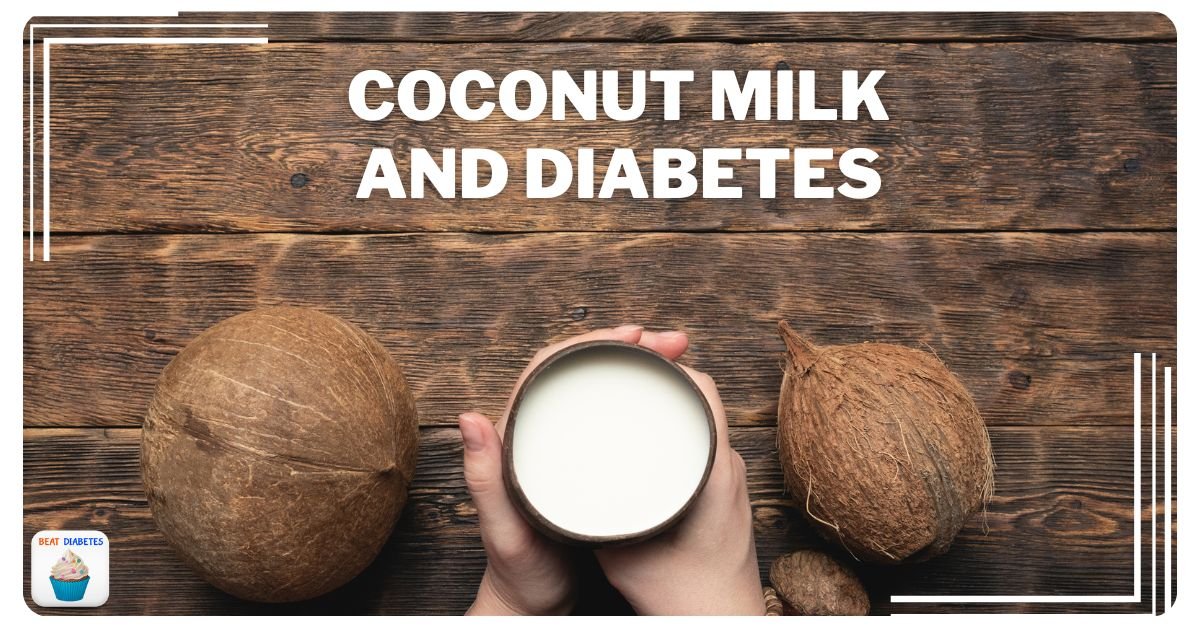Last Updated on May 13, 2023 by Dr Sharon Baisil MD
One aspect of the diet that diabetics often question is whether they can consume coconut milk safely. Coconut milk has gained popularity in recent years due to its rich flavor and creamy texture. It is made by blending grated coconut meat with water and then straining it through a cheesecloth or fine mesh sieve.
Coconut milk contains various nutrients such as vitamins C and E, iron, potassium, magnesium, and phosphorus. However, there are concerns about its high-calorie content and potential impact on blood sugar levels for those living with diabetes. This article aims to explore the benefits and risks of consuming coconut milk for diabetics while providing insights into how much they should consume daily along with other healthy drinks options available for them.
What is coconut milk?
The liquid extracted from the grated flesh of the matured coconut, commonly known as coconut milk, has been a staple ingredient in various cuisines and vegan diets.
It is made by blending or pressing fresh or dried coconut meat with water to form a creamy white liquid that is rich in nutrients. Coconut milk contains vitamins C, E, B1, B3, B5, and B6; minerals such as iron, calcium, magnesium, and potassium; and medium-chain fatty acids (MCFAs) that have been linked to several health benefits.
Coconut milk has gained popularity among people with diabetes due to its potential impact on blood sugar levels. MCFAs are easily absorbed by the body and converted into energy rather than stored as fat. This means that consuming coconut milk may help regulate blood sugar levels by providing a steady source of energy while preventing spikes in glucose levels. Additionally, coconut milk contains fiber that slows down the digestion process and reduces the rate at which carbohydrates are broken down into glucose.
What are the benefits of coconut milk for diabetics?
Research suggests that incorporating certain plant-based milk into a diabetic diet plan may offer potential benefits for managing blood sugar levels. Coconut milk, in particular, has gained attention for its unique nutrient composition and potential health benefits for individuals with diabetes.
Here are some of the benefits of coconut milk for diabetics:
- Low glycemic index: Compared to other dairy-based or soy milk, coconut milk has a lower glycemic index which means it doesn’t cause sudden spikes in blood sugar levels. This makes it an ideal choice for individuals with diabetes who need to regulate their blood glucose levels.
- Rich in healthy fats: Coconut milk contains medium-chain fatty acids that can be easily metabolized and used as energy by the body. These healthy fats can also help improve insulin sensitivity, which is essential for individuals with type 2 diabetes.
- Contains essential nutrients: Coconut milk is rich in vitamins C, E, B1, B3, B5, and B6 which can help support the overall health and well-being of individuals with diabetes.
- Can aid weight loss: Research suggests that consuming coconut milk can help reduce BMI and waist circumference among obese individuals with type 2 diabetes.
- Anti-inflammatory properties: Coconut milk contains compounds such as lauric acid that possess strong anti-inflammatory properties. This can be beneficial for individuals with diabetes who are at a higher risk of developing chronic inflammation.
In short, incorporating coconut milk into a diabetic diet plan could provide several potential benefits such as improved insulin sensitivity and regulation of blood glucose levels. However, it’s important to keep portion sizes in check as coconut milk is high in calories and saturated fat. Consultation with a registered dietitian or healthcare professional before making any dietary changes is recommended.
Improving insulin sensitivity
Improving insulin sensitivity is a crucial aspect of managing type 2 diabetes, as it allows the body to effectively use glucose for energy, much like a well-oiled machine that can efficiently convert fuel into energy.
Insulin is a hormone produced by the pancreas that helps transport glucose from the bloodstream into cells to be used as energy. When there is insulin resistance, which occurs in type 2 diabetes, the body does not respond properly to insulin, causing blood sugar levels to remain high.
However, research has shown that consuming coconut milk may help improve insulin sensitivity and lower blood sugar levels. Coconut milk contains lauric acid, a medium-chain fatty acid that has been found to improve insulin sensitivity in animal studies.
Additionally, some studies have shown that consuming coconut products may lead to better glycemic control in people with type 2 diabetes. This suggests that including coconut milk in one’s diet may have potential benefits for those with diabetes or at risk of developing it.
While more research is needed on this topic, incorporating moderate amounts of coconut milk into one’s diet may be a helpful step towards improving overall glucose control and reducing complications associated with diabetes.
Protecting against heart disease
Protecting against heart disease is a critical aspect of managing type 2 diabetes, as those with the condition are at higher risk for developing cardiovascular complications.
Coconut milk has been found to have potential benefits in this area due to its unique composition.
While it does contain saturated fat, which has been linked to an increased risk of heart disease, coconut milk also contains medium-chain triglycerides (MCTs).
MCTs have been shown to improve blood lipid profiles and reduce inflammation, both of which are important factors in preventing heart disease.
Research has also suggested that coconut milk may help lower blood sugar levels and improve insulin sensitivity.
This is significant for diabetics as high blood sugar levels can contribute to the development of heart disease.
A study published in the Journal of Medicinal Food found that consuming coconut milk improved insulin sensitivity in rats with diabetes.
Another study conducted on humans with type 2 diabetes showed that consuming coconut oil (which contains MCTs like coconut milk) helped improve glycemic control and reduce waist circumference compared to a control group who consumed olive oil.
However, more research is needed to fully understand the effects of coconut milk on heart health and blood sugar regulation in humans with diabetes.
Boosting metabolism
Understanding the potential metabolic benefits of a specific food item can be crucial for individuals seeking to improve their overall health and well-being. Coconut milk, a popular ingredient in many dishes across the world, has been found to have various impacts on metabolism that may benefit people with diabetes.
Here are four ways coconut milk may boost metabolism:
- Lowers blood sugar levels: Studies have shown that coconut milk can help lower blood glucose levels in people with diabetes due to its high fiber content and low glycemic index.
- Improves insulin sensitivity: The medium-chain triglycerides (MCTs) found in coconut milk can enhance insulin sensitivity, making it easier for cells to absorb glucose from the bloodstream.
- Increases energy expenditure: MCTs have also been shown to increase energy expenditure compared to other types of fats, which may contribute to weight loss and improved metabolism.
- Contains essential nutrients: Coconut milk is rich in vitamins C, E, B1, B3, B5, and B6 as well as minerals such as iron, magnesium, phosphorus, and potassium that play vital roles in regulating metabolism.
Overall, while more research is needed on the specific effects of coconut milk on metabolism and diabetes management, current evidence suggests that incorporating this ingredient into one’s diet may provide several metabolic benefits for individuals living with diabetes.
What are the risks of coconut milk for diabetics?
Individuals with diabetes who consume foods high in saturated fat and calories may be at increased risk for elevated cholesterol levels and weight gain. Coconut milk, which is commonly used as a dairy alternative and ingredient in various dishes, contains significant amounts of saturated fats that can raise cholesterol levels.
Saturated fats can contribute to the development of insulin resistance, leading to higher blood glucose levels and increasing the risk for type 2 diabetes complications. Moreover, coconut milk has a high glycemic index (GI), meaning it can cause rapid spikes in blood sugar levels.
This effect can be particularly concerning for individuals with diabetes who struggle with maintaining stable blood sugar levels. While coconut milk may offer some health benefits due to its nutrient content, including vitamins C and E, iron, selenium, magnesium, potassium, and phosphorus among others; individuals with diabetes should limit their intake of coconut milk to avoid potential negative effects on their health.
What are the Nutritional values of Coconut milk?
This table represents the nutritional components available in coconut milk and their respective quantities:
| Sl. No. | Nutrients available in 1 cup | Amount available |
| 1. | Calories | 445 |
| 2. | Carbohydrates | 6.35 g |
| 3. | Fats | 48.21 g |
| 4. | Proteins | 4.57 g |
| 5. | Water | 164.71 g |
| 6. | Calcium | 41 mg |
| 7. | Iron | 7.46 mg |
| 8. | Potassium | 497 mg |
| 9. | Magnesium | 104 mg |
| 10. | Vitamin C | 2.30 mg |
How much coconut milk can diabetics consume per day?
Limiting the intake of saturated fat and calories is crucial for individuals with diabetes, and current guidelines suggest consuming no more than one cup per day of coconut milk.
Coconut milk is high in saturated fat, which can cause an increase in cholesterol levels. This is a concern for individuals with diabetes who already have higher risks of heart disease. Therefore, it’s recommended that people with diabetes who also have high cholesterol levels limit their intake of coconut milk even further.
Although coconut milk has some benefits for overall health, it still contains sugars that can impact blood sugar levels among diabetes patients. The glucose content in coconut milk may lead to an increase in blood sugar levels if consumed excessively or without proper monitoring.
However, research suggests that regular consumption of coconut products may improve insulin sensitivity in healthy individuals. Thus, moderation is key when it comes to incorporating coconut milk into the diet of a person living with diabetes.
What are some other healthy drinks for diabetics?
For individuals with diabetes, incorporating healthy drinks into their diet is crucial for maintaining blood sugar levels. Drinking unsweetened tea or coffee can be like adding a coat of paint to a well-built house, providing extra protection and support.
Along with these options, there are other healthy beverages that can help diabetics on their journey toward a healthy lifestyle.
- Water: This is the most natural drink that can help in regulating blood sugar levels by flushing out excess glucose through urine.
- Low-fat milk: It contains proteins and carbohydrates that slow down the absorption of glucose into the bloodstream.
- Sparkling water: A refreshing option that helps in staying hydrated without any added sugars or calories.
- Unsweetened Green Tea
- Sugar-free fruit juices
- Plant-based milk
- Whole-fruit smoothies
As always, it’s essential to monitor one’s glucose level after trying new foods or drinks to ensure they are compatible with individual needs and health goals.
Conclusion
Coconut milk is a popular dairy-free alternative that many people with diabetes may consider incorporating into their diet.
While it has been found to have some potential benefits for diabetics, including improved blood sugar control and reduced inflammation, there are also some potential risks to be aware of.
These include its high calorie and fat content, which could contribute to weight gain and other health problems.
Despite these potential risks, coconut milk can still be a healthy addition to a diabetic’s diet when consumed in moderation as part of an overall balanced eating plan.
References
- https://pubmed.ncbi.nlm.nih.gov/17570262/
- https://pubmed.ncbi.nlm.nih.gov/25636220/
- https://www.heart.org/en/news/2018/05/01/advisory-replacing-saturated-fat-with-healthier-fat-could-lower-cardiovascular-risks
- https://www.hsph.harvard.edu/nutritionsource/potassium/
- https://www.researchgate.net/publication/335684197_Free_radical_oxidative_stress_and_diabetes_mellitus_A_mini_review
- https://academic.oup.com/ajcn/article/111/6/1252/5823795









